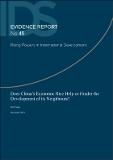| dc.contributor.author | Fujita, Mai | |
| dc.date.accessioned | 2013-12-18T14:41:04Z | |
| dc.date.available | 2013-12-18T14:41:04Z | |
| dc.date.issued | 2013-12 | |
| dc.identifier.citation | Fujita, M. (2013) 'Does China's Economic Rise Help or Hinder the Development of its Neighbours?', IDS Evidence Report 45, Brighton: IDS | en_GB |
| dc.identifier.uri | https://opendocs.ids.ac.uk/opendocs/handle/20.500.12413/3275 | |
| dc.description.abstract | With its huge size, vast low-cost labour force, and deep industrial foundation, China has become a major producer of a wide range of manufactured goods that is now moving towards the acquisition of innovation capabilities.
The impact of China’s rapid economic growth is felt globally via international trade. Particularly among China’s less-developed neighbours trying to develop their own industries, one of the most pressing questions is: does China’s economic rise help or hinder the industrial development of its neighbours?
Recent literature argues that the answer to the above question depends to a considerable extent on the status of the country. According to these authors, Asia’s more advanced nations benefit from the complementary effects of Chinese industrialisation. China’s rise as a platform for labour-intensive international trade helps the industrial development of these countries because Chinese exports depend to a great extent on capital equipment and components sourced from such countries.
China’s less-developed neighbours however suffer from the competitive effects of its growth. China’s rise often hinders the industrial development of these countries as they specialise in labour-intensive industries in which China has come to play a dominant global role. Their opportunities for exporting to China meanwhile are limited in the main to unprocessed products.
This study acknowledges the above distinction as an important starting point, but attempts to take the debate one step further. A critical element missing from the existing literature is the dynamics of change over time. To date, limited empirical research has shed light on how the impact of China’s economic rise has shifted over time, and why it has done so. The present research paper seeks to fill these knowledge gaps, which it attempts by engaging in a longitudinal analysis of the Vietnamese motorcycle industry. | en_GB |
| dc.description.sponsorship | DFID | en_GB |
| dc.language.iso | en | en_GB |
| dc.publisher | Institute of Development Studies (ID) | en_GB |
| dc.relation.ispartofseries | Evidence Report;45 | |
| dc.rights.uri | http://creativecommons.org/licenses/by/3.0/ | en_GB |
| dc.subject | Economic Development | en_GB |
| dc.title | Does China's Economic Rise Help or Hinder the Development of its Neighbours? | en_GB |
| dc.type | IDS Evidence Report | en_GB |
| dc.rights.holder | Institute of Development Studies (IDS) and the Human Rights Awareness and Promotion Forum (HRAPF) | en_GB |
| dc.identifier.ag | OT/11009/5/1/522 | |
| dc.identifier.team | Globalisation | en_GB |


